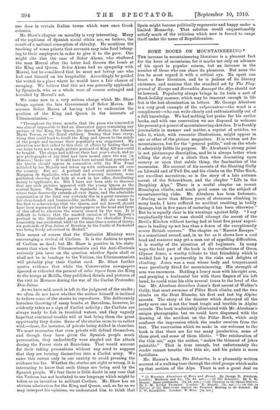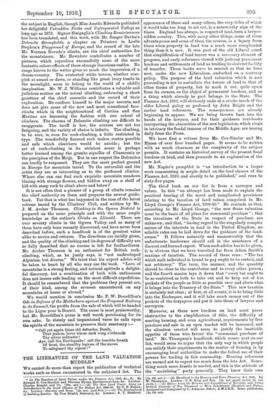SOME BOOKS ON MOUNTAINEERING.* THE increase in mountaineering literature is
a pleasant fact for the lover of mountains, for it marks not only an advance of his sport in popular esteem, but an increase in the number of those who can share its pleasures. But none the less he must regard it with a critical eye. No sport can boast a finer literature, and he is jealous of its literary eminence, and anxious that the standard set by The Play- ground of Europe and Scrambles Amongst the Alps should not be lowered. Popularity always brings in its train a sort of Bank-holiday manner, which may be innocent enough in life but is the last abomination in letters. Mr. George Abraham is a very good example of the vulgarisateur—the word is a compliment—who can write clearly and enthusiastically out of a full knowledge. We had nothing but praise for his earlier books, and with one reservation we are disposed to welcome the present pot-pourri of mountaineering sketches. It is frankly journalistic in manner and matter, a reprint of articles, we take it, which, with romantic illustrations, might appear in one or other of the picture magazines. It is written not for mountaineers, but for the " general public," and on the whole it admirably fulfils its purpose. Mr. Abraham's strong point is not picturesque description, and he is always better when telling the story of a climb than when descanting upon scenery or upon that subtle thing, the fascination of the mountains. His account of his ascents of the Slanting Gully on Lliwedd and of Twll Du, and his climbs on the Pillar Rock, are excellent narratives; so is the story of a late autumn ascent of the Schreckhorn, and the chapter "Life in the Dauphiny Alps." There is a useful chapter on recent Himalayan climbs, and much good sense on the subject of mountaineering risks. Mr. Abraham has been fortunate. "Daring more than fifteen years of strenuous climbing in many lands, I have suffered no accident resulting in bodily damage, but in five years of motoring it has been otherwise." But he is equally clear in his warnings against folly. "I say emphatically that no man should attempt the ascent of the Devil's Kitchen without having had at least five years' experi- ence in leading up not less than a dozen of the exceptionally severe British courses." The chapter on " Narrow Escapes " is a sensational record, and, in so far as it shows how a cool head and resource may get a man oat of appalling difficulties, it is worthy of the attention of all beginners. In many ways the best part of the book is the recollections of Owen Glynne Jones, a worthy tribute to that friendship which is welded fast by a partnership in the risks and delights of climbing. Jones was a man whose body and temperament were peculiarly fitted for mountaineering. His strength of arm was enormous. Holding a heavy man with his right arm, and grasping a horizontal bar with three fingers of his left hand, he could raise his chin several times to the level of the bar. Mr. Abraham describes Jones's first ascent of Walker's Gully, that most awesome of Pillar Rock climbs, and the two climbs on the Dent Blanche, his first and last big Alpine ascents. The story of the disaster which destroyed all the party save one is not the least tragic and terrible in Alpine records. The book is admirably illustrated with Mr. Abraham's unique photographs, but we could have dispensed with the drawing of the accident on - the Pillar Rock, which only confuses the impression which the reader receives from the text. The reservation which we make in our welcome to the book is that there are far too many jocularities, some of them good. and some of them idiotic. " The exhilaration of the thin air," says the author, " makes the thinnest of jokes palatable." That is true enough, but unfortunately the reader cannot breathe this thin air, and his palate is more fastidious.
Mr. Hamer's book, The Dolomites, is a pleasantly written account of a walking tour through the chief groups which make up that section of the Alps. There is not a great deal on
• (1) Mountain Adventures at Monte and Abroad. By George D. Abraham. London : Methuen and Co. 17s. 6d. net.]—(2) The Dolomites. By B. H. Ramer. Same publishers. [7s. 6d. net.]—(3) Climbing in the Ogwen District. By J. M.' Archer Thomson. London : E. Arnold. [5s. net.]— (4) Ode. in Defence of the Matterhorn against the Proposed Bezilvay to its Summit. By F. W. Bourdillon. London : W. Bice. [Is. net.] the subject in English, though Miss Amelia Edwards published her delightful Untrodden Peaks and Unfrequented Valleys as long ago as 1873. Signor Sinigaglia's Climbing Reminiscences has been translated, and this work, with Mr. Sanger Davies's Dolomite Strongholds, a chapter on Primiero in Leslie Stephen's Playground of Europe, and the record of the late Mr. Norman Neruda's climbs, are the chief authorities for
the mountaineer. Mr. Rowntree contributes a number of pictures, which reproduce successfully some of the more fantastic colour-effects of these strange limestone castles. No range known to the writer gives so much the impression of a dream-country. The contorted white towers, whether rose- pink at sunset or dawn, or standing like great ivory tombs in the moonlight, seem to belong to the world of a child's imagination. Mr. W. J. Williams contributes a valuable and judicious section on the actual climbing, embracing a short gazetteer of the chief summits and the record of their exploration. He confines himself to the major ascents, and does not give some of the new and most sensational face- climbs which in the neighbourhood of Cortina and San Martino are becoming the fashion with one school of climbers. The charms of Dolomite climbing are difficult to exaggerate. The tariff is low, the courses are not too fatiguing, and the variety of choice is infinite. The climbing,
to be sure, is, even for rock-climbing, a little restricted in type. The wonderfully fissured rock makes routes possible and safe which elsewhere would be suicide ; but the art of rock-climbing in its strictest sense is perhaps better learned among the granite aiguilles of Chamonix or the precipices of the Meije. But in one respect the Dolomites
can hardly be surpassed. They are the most perfect ground in Europe for mountain travel. To the naturalist and the artist they are as interesting as to the professed climber.
Where else can one find such exquisite mountain meadows blazing with strange flowers, and hidden away on a shelf of hill with steep rock to climb above and below ?
It is not often that a pioneer of a group of climbs remains the chief authority on them and prepares the newest guide- book. Yet that is what has happened in the case of the latest
volume issued by the Climbers' Club, and written by Mr. J. M. Archer Thomson. Climbing in the Ogwen District is prepared on the same principle and with the same ample knowledge as the author's Climbs on Lliwedd. There are over seventy climbs in the Ogwen Valley, and as many of
them have only been recently discovered, and have never been described before, such a handbook is of the greatest value alike to novice and veteran. The directions are lucidly given, and the quality of the climbing and its degrees of difficulty are so fully described that no excuse is left for foolhardiness.
Mr. Archer Thomson is an enthusiast for British rock- climbing, which, as he justly says, is " not undeveloped Alpinism, but diverse." We trust that his expert advice will be taken to heart by all who may use the book. "Love of mountains is a strong feeling, and natural aptitude a delight- ful discovery, but a combination of both with enthusiasm does not insure safe leading on the most difficult expeditions. It should be remembered that the problems they present are, of their kind, among the severest encountered on any mountains at home or abroad."
We would mention in conclusion Mr. F. W. Bourdillon's Ode in Defence of the Matterhorn against the Proposed Railway to its Summit, the profits from the sale of which will be handed to the Ligue pour in Beaute. The cause is most praiseworthy, but Mr. Bourdillon's poem is well worth purchasing for its own sake. In stately and impassioned verse he calls upon the spirits of the mountain to preserve their sanctuary " Call yet again thine old defender, Death, That jealous lover whose dark wing o'erbroods Thy silver solitudes ! Aye, call the Earthquake ! call the terrible breath Of frost, the stealthy legions of the snows To safeguard thy repose!"







































 Previous page
Previous page